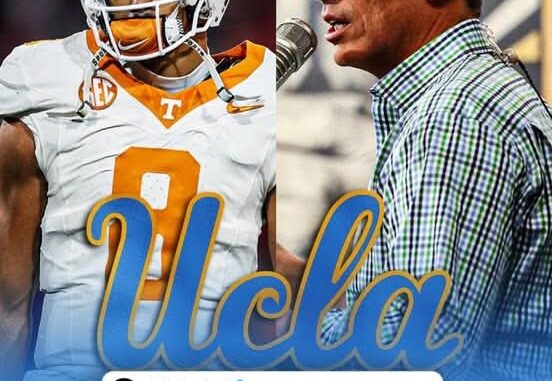
Seismic Shift in College Football: Nico Iamaleava’s Transfer to UCLA Sends Shockwaves Through the Landscape – Analyzing the Implications of the High-Profile Move, Examining NIL Influence, and Exploring the Future Prospects for Both Programs
LOS ANGELES, CA & KNOXVILLE, TN – The college football world is reeling from a significant transfer announcement: Tennessee Volunteers quarterback Nico Iamaleava is officially heading to UCLA, according to prominent sports commentator Colin Cowherd. The move, a stunning development reported by Football247Updates.com.ng, marks a significant shift in the landscape of collegiate athletics and raises crucial questions about the evolving dynamics of player transfers, the influence of NIL (Name, Image, and Likeness) deals, and the future prospects of both the Tennessee Volunteers and the UCLA Bruins programs.
The transfer of a highly-touted quarterback like Iamaleava is inherently newsworthy, but the circumstances surrounding this particular move add layers of complexity and intrigue. Iamaleava’s departure from Tennessee, following a controversial season marked by inconsistent performance and off-field speculation, signals a significant shift in the trajectory of his collegiate career. The move to the West Coast, a departure from his established Southeastern Conference roots, reflects a decisive break from his past and a calculated leap into a new athletic and potentially lucrative environment.
The move to UCLA is particularly interesting considering the Bruins’ existing quarterback situation. The team already possesses established talent at the quarterback position, which implies that Iamaleava’s transfer may be driven by more than just on-field opportunities. The factors potentially motivating this decision transcend mere playing time, suggesting the influence of other factors, most prominently the increasingly significant role NIL deals play in shaping player decisions.
The speculation regarding Iamaleava’s motivations centers heavily on the burgeoning NIL market. The potential for significantly larger endorsement deals and lucrative marketing opportunities on the West Coast might be a primary driver of his decision. The California market, known for its robust entertainment and media industries, presents considerably more potential for brand building and financial gain than the traditionally more conservative environment of the Southeastern Conference. This suggests a growing trend in college athletics, where lucrative financial opportunities are becoming an increasingly important factor in shaping player decisions.
The ramifications of Iamaleava’s transfer extend beyond the two programs directly involved. The move serves as a stark reminder of the transformative impact NIL deals are having on the landscape of college football. It underscores the growing influence of financial considerations on player decisions, potentially shifting the emphasis away from traditional factors such as team loyalty, coaching style, and program history. This highlights a critical turning point in college football, questioning the long-term sustainability of a system increasingly driven by financial considerations.
For the Tennessee Volunteers, Iamaleava’s departure leaves a void at the quarterback position. The program will need to adjust its strategies and potentially accelerate its search for a replacement, potentially impacting the team’s competitive prospects for the upcoming season. The unexpected nature of this transfer necessitates a swift and strategic response from the Tennessee coaching staff to mitigate the potential disruption and ensure the team remains competitive.
Conversely, UCLA benefits from the addition of a highly touted quarterback prospect. However, the integration of Iamaleava into the existing system will require careful management and strategic planning. The Bruins must ensure that the new quarterback’s arrival doesn’t create internal conflict or destabilize the team’s existing dynamics. Moreover, the program must now manage the increased attention and scrutiny that comes with securing a player of Iamaleava’s caliber.
The move underscores the escalating power dynamics within college football. The ability of players to leverage NIL deals to influence their transfer decisions empowers them in ways previously unimaginable. This places greater responsibility on both institutions and governing bodies to navigate these changing dynamics in a fair and ethical manner. The incident highlights the need for more transparent regulations and ethical guidelines regarding NIL deals to ensure that these opportunities don’t compromise the integrity and traditional values associated with college athletics.
Nico Iamaleava’s transfer to UCLA is more than just a player moving to a new school; it’s a symbolic shift in the power dynamics of college football, a clear illustration of the evolving role of NIL, and a compelling narrative that will continue to shape the discussion surrounding the future of the sport. The ramifications of this decision will be felt across the collegiate landscape, creating a ripple effect that will challenge existing norms and force a broader re-evaluation of how the future of college football will evolve.
Leave a Reply